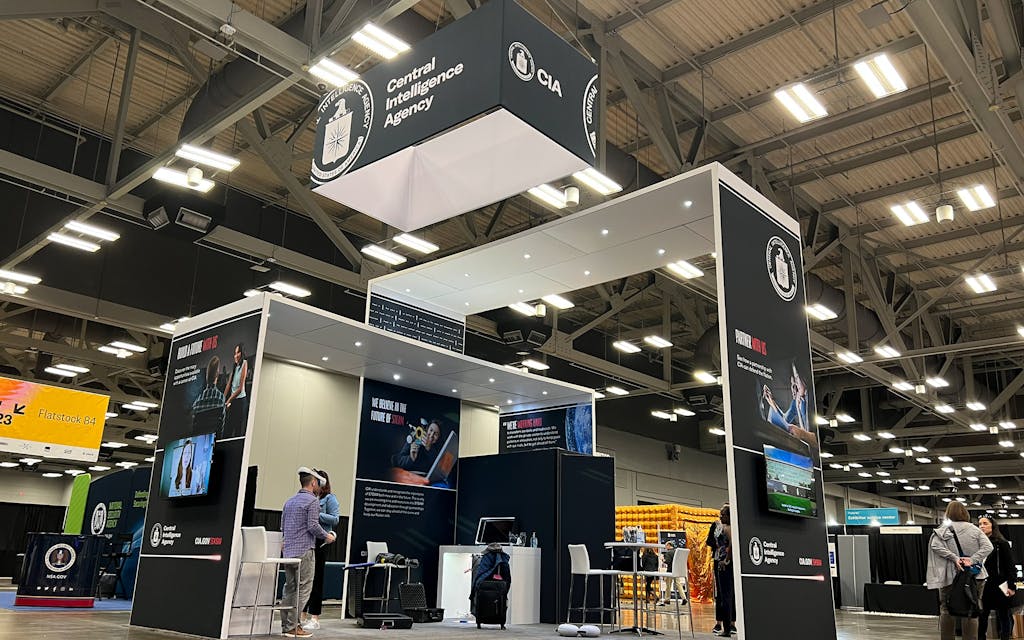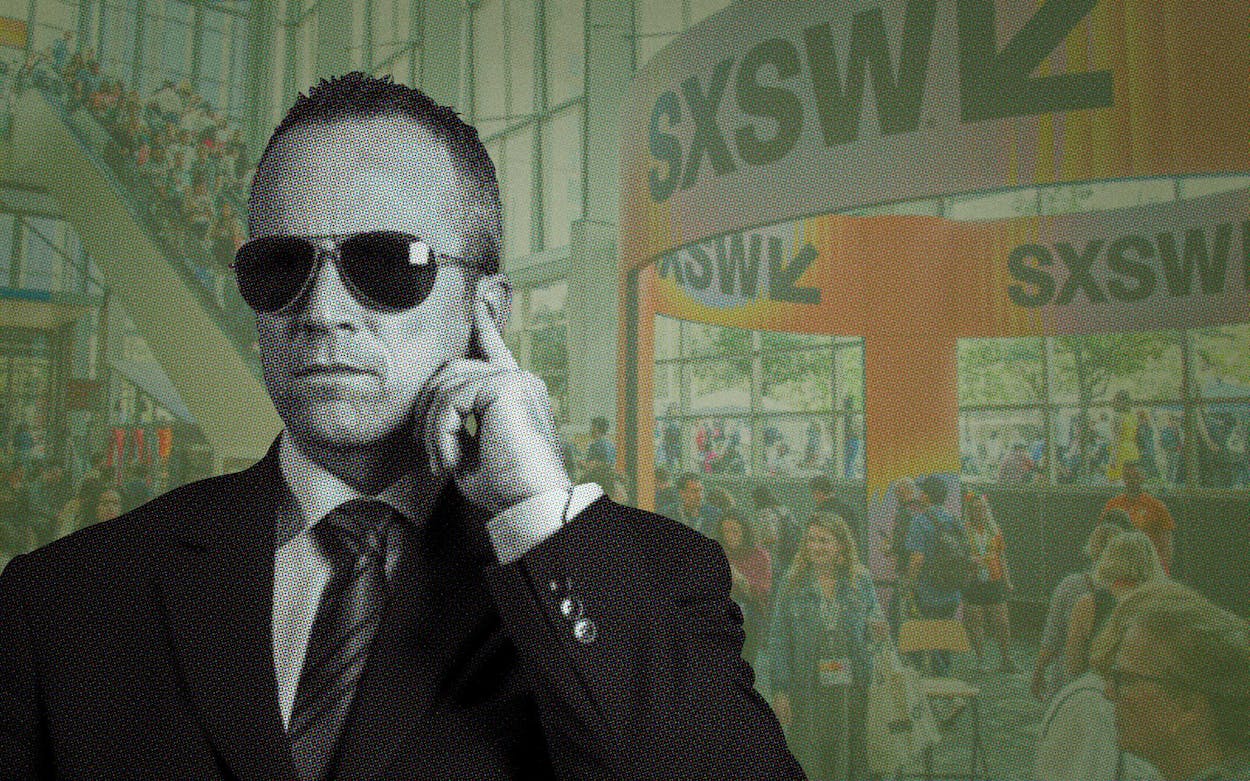Like so many strange developments over the past several years, it started with a tweet. In February, as brands, filmmakers, musicians, tech companies, and others began announcing their plans to visit Austin in March for SXSW, one surprising organization chimed in: “We’re flying south to SXSW!” proclaimed the Central Intelligence Agency’s Twitter account. The tweet featured an image of birds flying past a colorful horizon, debuted the hashtag #CIASXSW, and hinted at what the agency would get up to at the festival.
The post immediately went viral (it’s now been viewed more than 1.3 million times) and provoked disdainful retweets by those who saw it as proof that the once-scrappy independent music festival was now not just dominated by corporate sponsors but also part of the machine of American empire. Filmmaker and activist Boots Riley, who premiered a new TV show at the festival on Saturday, was among those who noted the CIA has an unsavory history that has allegedly included using the sorts of artists who appear at SXSW.
Others found the whole notion of #CIASXSW more amusing than dangerous. Last Friday, on the first day of the festival, a comedy event at the club Mohawk Austin billed itself as “The CIA presents: JT Kelley’s Comedy Night.” Social-media jokes abounded about government spies playing the festival for free, or popping in to a brand activation. Still, the question remained: What would the CIA be doing at SXSW?
The answer is simple: recruiting. This may be the first year that the CIA went viral by tweeting out its plans for the festival, but it’s not the first year the agency has been involved. Its first SXSW was back in 2017, and according to Lili Espinosa, a diversity recruitment leader at the agency, the original goal was to look for new LGBTQ staffers. “Austin is a great engagement opportunity for that,” she said. “That’s how it started, and then we expanded into more of a focus on the STEAM [Science, Technology, Engineering, Arts, and Math] area. Now we are bringing our officers from the science and technology area, our digital innovation area, and other parts of the organization.” While an agency spokesperson declined to reveal how successful its recruitment efforts at SXSW have been—this is still the CIA, after all—its expanded footprint at the festival indicates that it’s yielding results.
This year, the spy org enhanced its visibility by hosting its first SXSW panel on Monday afternoon—and it was a hot ticket, with curious folks forming a line that snaked around the fourth floor of the downtown Austin Hilton to hear a presentation on how technology has “supercharged” spying. The agency also hosts a flashy booth in the festival’s Creative Industries Expo at the Austin Convention Center, where visitors can kick back, hang with some CIA officers, and explore the exterior of the Langley headquarters in Washington, D.C., in virtual reality. It’s all very . . . weird, for those accustomed to thinking of the CIA as a shadowy group of Cold Warriors fond of funding foreign coups.
That’s an impression that the agency’s presence at SXSW seems aimed at changing. Its booth has proven to be a popular destination, even at 9:30 on a Tuesday morning (practically Zero Dawn Thirty in SXSW terms). There’s certainly no attempt to conceal whose stall this is, or what the agency is there to do—the booth displays floor-to-ceiling banners emblazoned with the CIA seal, beneath which the words “Partner With Us” appear in all caps, next to a photo of two young women of color smiling as they gaze at a glowing computer screen.

The CIA found the right personalities to send to SXSW. The representatives I met were all friendly folks who didn’t seem at all out of place. Walter Trosin, an affable young bearded dude who works as a spokesperson for the agency’s Office of Public Affairs, was greeting visitors with the eager approachability of a startup founder. Sheetal Patel, the assistant director of the CIA’s Transnational and Technology Mission Center, lamented to me that she couldn’t get in to see eighties synth-rock legend New Order play at the Moody Theatre the night before.
Patel said the CIA’s visibility at SXSW gives her and her colleagues a chance to come across as a bit more relatable. “We’re all human,” Patel said, “We all have errands to run, dry cleaning to drop off, kids to drop off at school.” As part of a recent push to be more public-facing, she noted, the agency sent higher-profile leaders to Austin this year—something that has, in the past, been unusual in any setting. “It’s the first time in decades where I think we’ve [appeared] collectively,” she said. At the Spies Supercharged panel, “you had me, you had the deputy director, you had the chief of digital innovation, and you had the CTO [chief technology officer], on a panel with more than five hundred people in the audience, talking about their years working at the agency. I’ve never seen that before.”
The staffers sent to Austin are looking for folks with a tech background, Patel said, but not necessarily just software developers and engineers. She rattled off a list of occupations the agency is targeting: accountants, hydrologists, linguists, political scientists, and others “in areas you would not even think of.”
And what recruitment methods are being used? In addition to engaging with those who sought them out after the spy panel and chatting up those who stop by the booth, Patel said the CIA officers and staffers are attending other panels and circulating the convention center to look for folks who are promoting projects that pique their interest. “We’ve already taken a lap around the convention center,” she said. “And we’ll do it a second time.”
At every SXSW, bands, brands, and businesses boldly declare that they’re “taking over Austin” for the week. The CIA, of course, is one of the few organizations to come to town with actual experience in taking over cities. But despite the agency’s heightened visibility, it made no such claims about the festival—and if you were a SXSW attendee who skipped out on the convention center to, say, party with Doritos or catch a glimpse of Keanu Reeves, it was easy enough to ignore the CIA’s presence. (You have probably overheard a joke or two about spies doing DJ sets on Sixth Street, though.) But then, operating under the radar is still well within the agency’s comfort zone.
- More About:
- Politics & Policy
- SXSW
- Austin








